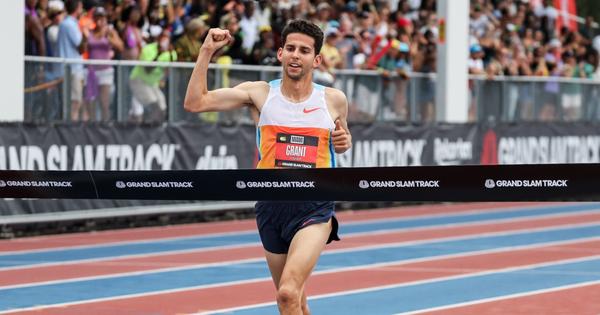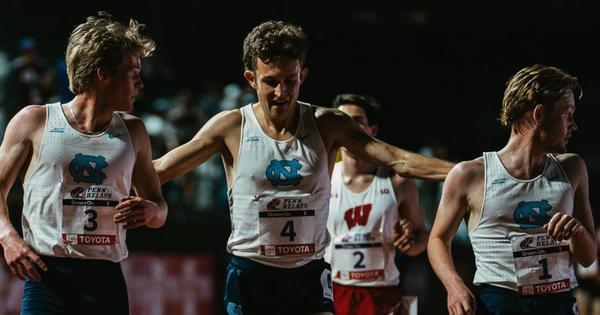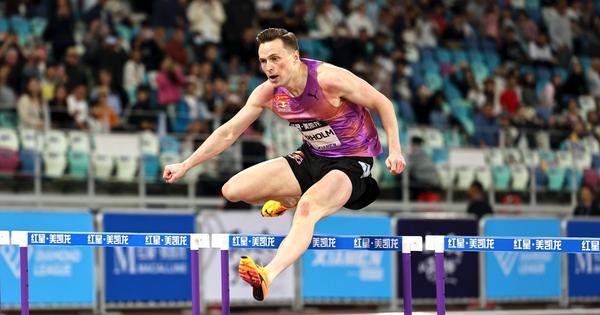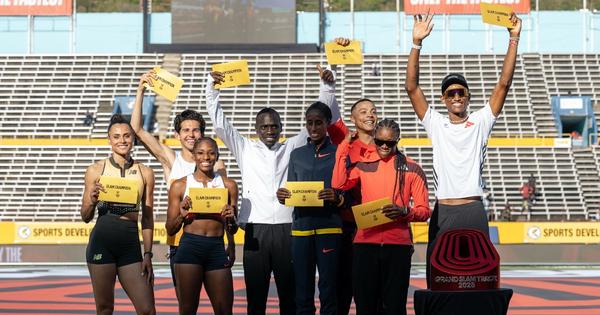By David Melly
May 7, 2025
We’re officially on second base now, halfway through the yearlong journey around the diamond that is the Grand Slam Track series (and all the questionable baseball metaphors that come with it).
Despite competing directly with the MLB itself and one of the more popular Kentucky Derbys in recent memory, the Miami edition of GST felt like it earned, and deserved, its spot on the sporting calendar in only its second iteration. On TV, viewers were treated to a tighter, brighter, and more lively presentation than Kingston, with less dead air and fewer broadcasting snafus. The smaller Miramar venue offered a more pleasing visual than the far-from-full National Stadium in Jamaica—it’s likely that fewer tickets overall were sold, the 5,000-seat Ansin Sports Complex suited the crowd better. The unique format still needs explaining for newcomers, but viewers who tuned in for both meets should be able to follow along easily by now, assuming you don’t struggle with very basic arithmetic.
And while times matter less than other track and field competitions, it certainly didn’t hurt to see some seriously fast marks thrown down. Miami’s friendly tailwinds proved far more pleasant for the sprinters than Kingston’s blustery gusts, and a bit more front-running bravery in the distance events led to three world-leading marks.
Overall, GST seems to have avoided a sophomore slump—in fact, athletes and meet organizers alike seemed to have adjusted and improved based on the feedback the first meet generated. And when juxtaposed with the second Diamond League meet in Shanghai (more on that below), it’s hard to argue that the new league hasn’t earned a place alongside its competitors.
Here’s more of what we learned from doubling back on the series that’s built for doubling:
Some athletes are perfect for the format. Sydney McLaughlin-Levrone makes sense as the poster child for GST for a lot of reasons. She’s not just one of the biggest names in the sport who brings record-setting attention to every race; she gets the chance to showcase her world-beating abilities in two events at once. The World Championships schedule and three rounds of racing make a 400m/400mH double tough, and the one-day DL format makes it nearly impossible. But GST is custom built for the athletes who can thrive in multiple events without looking out of place, and SML following up a world-leading 52.07 hurdles performance with a conservatively-paced 49.69 flat 400m the next was a sight to see.
Josh Kerr, who loves a championship 1500m but still has the footspeed to contend in the 800m, reminded the world this weekend why his early signing with the league was so exciting. With the early-season hip injuries and illness in his rearview, Kerr kicked his way to a 3:34.71 1500m win via a 53.34 final 400m then doubled back to his first 800m PB in nearly six years, running 1:45.01 to improve on his mark from Kingston by over five seconds.
Non-GST sprinters probably don’t love the fact that the league forces athletes to learn how to double… because that necessity has turned both Kenny Bednarek and Melissa Jefferson-Wooden into world-class threats in their respective weaker events. In fairness to Bednarek, he’s been honing his chops in the 100m for the last several seasons, even making the Olympic final last summer, but now he feels nearly equally lethal in both events.
Jefferson-Wooden, on the other hand, didn’t run a single 200m last season, and now she’s lurking in Gabby Thomas’s shadow with a 22.15 PB, good enough to defeat Thomas, the Kingston long sprints Slam champion (Slampion?) in the short sprints standings.
Others learned lessons from Kingston. After losing her first 400m in over a year in Kingston, Marileidy Paulino wasn’t about to make the same mistake twice. A few weeks of training later and she fairly handily dispatched rival Salwa Eid Naser in both the 400m and the 200m, leaving nothing up to chance in the latter event as she clocked a personal best and Dominican national record of 22.30. Paulino is one of the fiercest competitors in the game, and while the winning time was a little slower (48.67 in Kingston vs. 49.21 in Miami), Paulino looked to be in the driver’s seat the entire homestretch.
It’s hard to say if Agnes Ngetich learned a lesson or simply is getting more comfortable racing on the track, but the road specialist still was able to muster the kick that evaded her in Kingston against Ejgayehu Taye. This time, when Medina Eisa gave Ngetich a challenge in the final lap of the 5000m, she was able to respond in kind and pick up a critical 12 points thanks to a 29.15 final 200m. Then, in the 3000m, she closed even faster (29.08), and while that was only good for third place, Ngetich had still mustered up enough points to walk away with the Slam title. It’s also worth noting that, despite the long distance fellas’ proclivity for jogging, both the women’s 3000m and 5000m were won in world-leading times.
And it seems like the meet organizers learned something else about the long distance fields: throwing a bunch of sub-3:50 milers at Grant Fisher will force him to work for his second $100,000 check. The 3000m starting slow as molasses meant that Challenger Andrew Coscoran was able to sneak a win with a 25.78 final 200m, the only sub-26 finish in the field, and while Fisher still finished second, he couldn’t play the 5000m quite as strategically to secure his bad. Instead, he learned a valuable lesson of his own: if you close your final 1600m in 3:57, no one will be able to hang with you. The chess match continues, and Grant’s on his way back to the bank.
Not winning can still be life-changing. For unsponsored or minimally-sponsored Slam competitors, the shiny $100,000 first prize isn’t the only reason to show up. For guys like Chris Robinson (second in the long hurdles), Jamal Britt (third in the short hurdles), or Jacory Patterson (second in the long sprints, winning the 400m in 43.98), the opportunity to pick up tens of thousands of dollars with a high finish could be transformative. Patterson will hopefully be able to clock fewer overnight shifts at UPS, for starters.
Running well as a Challenger can also mean an invite back, which can be lucrative as well. Dylan Beard, Ackeem Blake, Andrenette Knight, and Cooper Teare must’ve impressed Kyle Merber in Kingston, because they all got the invite back for Miami. In Knight’s case, she’s now $80,000 richer thanks to second-place finish last weekend on top of her third-place finish in Jamaica.
The short hurdles is rapidly becoming a fan-favorite. In the Short Hurdles category, the entrants are living up to the “only the fastest” mantra, thanks in large part to Masai Russell’s stunning American record performance on Friday evening. Already the Olympic champ, Russell is now the second fastest woman of all time with her 12.17 performance in the 100m hurdles, inheriting the record-holder title from fellow Kentucky Wildcat Keni Harrison, who finished fourth in a season’s best 12.40.
Right on her heels, Tia Jones became the third woman ever under 12.20, with her 12.19 run, knocking an incredible 0.21 seconds off her lifetime best. And, somehow, none of the three women went home with the top prize, as Ackera Nugent’s 12.34/11.09 double put her one point ahead of Russell in the standings. It’s also worth noting that Nugent’s winning time in the flat event puts her at No. 12 in the world in the flat 100 meters this season.
In the men’s event, Trey Cunningham’s debut as a Challenger went about as well as he could’ve hoped, as he won both the 110m hurdles and the 100m in stunning fashion. Cunningham equalled his lifetime best in the hurdles, clocking a 13.00 mark that would’ve been a world lead had fellow American Cordell Tinch not put down an incredible race on the other side of the world a few hours prior. In the 100m, Cunningham’s 10.17 was a lifetime best, and despite also running PBs in both events, Miami champion Sasha Zhoya was relegated to second place.
The two-event format in the hurdles adds more uncertainty than perhaps any other, and thus, more excitement. Zhoya and Cunningham, in particular, embraced the competition-forward nature of the event with a lot of pre-race trash talk over who had better footspeed. And it’s not crazy to suggest that all this extra speedwork is yielding historically fast times overall—let’s not forget that Tinch was a Challenger in Kingston as well.
With season-long narratives beginning to build and most of the kinks worked out, GST has become less a novelty and more a legitimate measure of the state of the sport. And now that there are five double champions, the gauntlet has been thrown down for a seasoned Racer or hungry Challenger to try and upset the pecking order. And with Philly three full weeks away, there’s plenty of time for anyone leaving Miami unsatisfied to manifest a change.

David Melly
David began contributing to CITIUS in 2018, and quickly cemented himself as an integral part of the team thanks to his quick wit, hot takes, undying love for the sport and willingness to get yelled at online.




